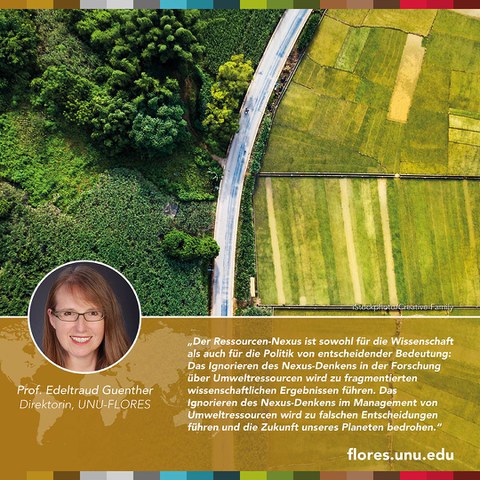Jan 26, 2021
Germany Renews Funding for UN University in Dresden Advancing the Resource Nexus: 8.4M Euros
The German Federal Government and the Free State of Saxony extend core funding of United Nations University (UNU) think tank in Dresden
The Federal Ministry of Education and Research of the Federal Republic of Germany (BMBF) and the Saxon State Ministry for Science, Culture and Tourism (SMWK) announced an 8.4 million euros extension of core funding for the UNU Institute for Integrated Management of Material Fluxes and of Resources (UNU-FLORES). The renewed support sees the global think tank at the forefront of integrated environmental management via the Resource Nexus through 2024.
With the Technische Universität Dresden (TU Dresden) as its strategic partner, UNU-FLORES has contributed valuable insights on the world’s environmental issues, establishing itself as a hub for research and capacity development on the Resource Nexus.
“The special profile of UNU-FLORES with its focus on the Resource Nexus is an excellent addition to the variety of topics in the Saxon university and research landscape. In the important future fields of environment and resource management, UNU-FLORES works on the interaction between industrialised nations and emerging or developing countries so that problem solutions can be transferred and applied on a local level worldwide. The Free State of Saxony considers the transfer of scientific findings into society and the economy – at a national and international level – as an essential contribution to mastering future challenges, and will continue to provide its support,” says State Minister for Science Sebastian Gemkow.
Since its inception in December 2012, UNU-FLORES has grown from strength to strength. With a growing team of experts from 19 countries, the Institute continuously works on expanding its network and the reach of its work to address the planet’s most significant challenges around depleting natural resources. In collaboration with TU Dresden and the Leibniz Institute for Ecological Urban and Regional Development (IOER), UNU-FLORES’s signature Dresden Nexus Conference (DNC) brings a wide range of stakeholders from science to policy and business to the Saxon capital to discuss the latest research and initiatives in sustainably managing environmental resources. DNC2020 – in its virtual form due to a global pandemic – attracted more than 1,000 people from about 100 countries.
Says UNU Rector, Dr David Malone: “UNU is deeply appreciative of the continued and valuable alliance between the Federal and State Ministries of Germany and Saxony. Through this very important partnership, UNU-FLORES can maintain its multilevelled contribution to the scientific landscape and communities of both Germany and the Global South.”
“If we are going to master the global challenges of our time – from climate change to corona – it has to be a collaborative effort between science, policy, and the private sector,” argues TU Dresden Rector Prof. Ursula Staudinger. “For the past eight years the United Nations University has been a valuable partner for TU Dresden in fostering such transdisciplinary activities. We look forward to continuing this work in the years to come.”
In its seventh year running, the first-of-its-kind Joint PhD Programme of UNU-FLORES and TU Dresden focused on the Resource Nexus has seen the first seven doctoral graduates.
“The Resource Nexus is vital for science as well as for policy: Ignoring nexus thinking in research on environmental resources will lead to fragmented scientific results. Ignoring nexus thinking in environmental resources management will lead to wrong decisions and threaten the future of our planet,” says UNU-FLORES Director, Prof. Edeltraud Guenther.
UNU-FLORES will celebrate its tenth anniversary in 2022.
Video Message UNU FLORES
United Nations University – Institute on the Integrated Management of Material Fluxes and of Resources (UNU- FLORES)
UNU-FLORES develops strategies to resolve pressing issues in the sustainable use and integrated management of environmental resources such as water, soil, waste, energy, and other geo-resources that are of concern to the United Nations and its Member States – particularly in developing and emerging economies. Based in Dresden, Germany, the Institute engages in research, capacity development, postgraduate teaching, advanced training, and knowledge dissemination to advance the Resource Nexus. https://flores.unu.edu/
Technische Universität Dresden (TU Dresden)
The Technische Universität Dresden (TU Dresden) is one of Germany’s eleven universities of excellence. Strong in research and considered first-class with respect to the range and quality of the study programmes it offers, it is also closely interconnected with culture, business, and society. The School of Civil and Environmental Engineering including the Faculties of Architecture, Civil Engineering Sciences, Environmental Sciences, Transportation and Traffic Science as well as Business and Economics, addresses diverse, interdisciplinary topics in research and teaching to create methods and technologies for sustainable developments. https://tu-dresden.de/
UNU-FLORES and TU Dresden are members of DRESDEN-concept – a research alliance of the TU Dresden together with the strong partnership of the research and culture areas resulting in the ideal way to communicate the excellence of research in Dresden. https://dresden-concept.de/
Media inquiries:
Atiqah Fairuz Salleh
Communications & Advocacy, UNU-FLORES
Tel.: +49 351 8921 9387
TU Dresden, Press Office
Tel.: +49 351 463-32398

